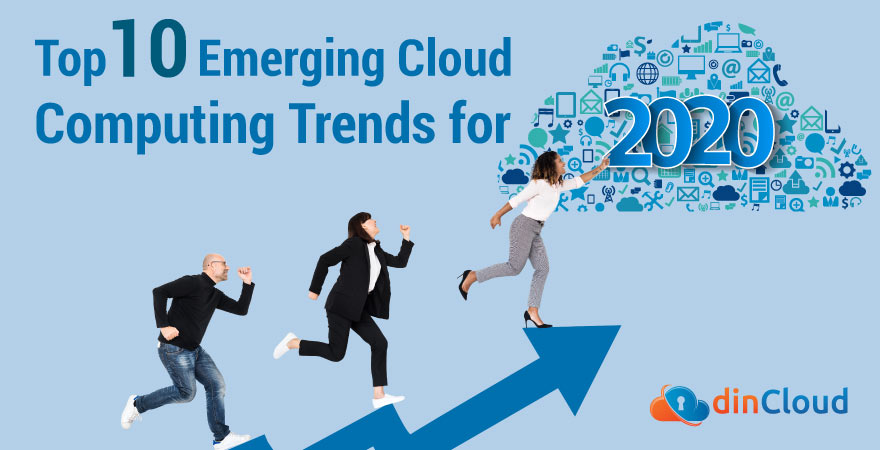The cloud computing revolution is showing no signs of slowing down even in the upcoming year 2020. As more entities of different sizes and industries truly appreciate the inherent Benefits of the Cloud, it is becoming increasing difficult for them to stay aloof.

However, this by no means implies that the cloud computing market is stagnant. Despite a phenomenal growth rate, the cloud industry is rife with shifting and emerging trends. In this post, we will try to highlight some of the most notable trends and help you better align your entity with the latest trends.
Also Read: Security Benefits of Cloud Computing Solutions
Multi Cloud Becomes the Norm
In the infancy phase of Cloud Solutions, even the idea of a fully functional multi cloud infrastructure seemed too farfetched for reality. Well, here we are at the footsteps of 2020 where multi cloud solutions can be extensively seen across a wide range of cloud tenants.
This trend is largely attributable to the way cloud industry has matured as a whole. Companies that were well entrenched in a certain niche further consolidated their position by improving their solutions on offer. A planned aspect of this development was to increase specialization to avert any imminent competition.
On the other hand, cloud tenants have also shifted their preferences from brand loyalty to efficiency. Any cloud based solution provider that has a more effective solution is bound to be adopted readily, even if it comes at the cost of abandoning an old and established Cloud Service Provider (CSP).
Containerization Gains Momentum
By now, most readers familiar with cloud based solutions should be well versed with the concept of containerization. This is an innovative way of clubbing various applications into a single package or offering that is called a container.
The other great feature of any well designed container is that most of the common application resources are shared, that adds to both efficiency and portability. We should see many new containerization based initiatives across the cloud computing industry that will further streamline and accelerate cloud based productivity solutions.
Industry Giants Pursue Containerization
The tremendous success and rapid adoption of containerization solutions offered by small industry players did not go unnoticed for long. The highly established giants of the cloud computing industry did not take long to follow suit and started working on their indigenous containerization initiatives.
This trend will gain more momentum over the coming year and cloud industry heavy weights such as Amazon, Google and Microsoft will invest heavily in their home grown containerized application suites. This will usher in a new wave of competition for creating the most efficient and lightweight cloud native applications.
Acquisitions of Container Orchestration Systems
A harsh reality of developing anything from scratch is that it not only takes a lot of time but also consumes a lot resources. An ironic aspect of any research and development (R&D) initiative is that even after investing time and money, one can never be sure of the outcome.
This is where the role of mergers and acquisitions comes into play. Over the coming year, we should see a lot of companies offering container based orchestration of applications either merge or get acquired by bigger industry players at hefty price tags.
One thing that is not on the side of large companies is time. They have all the resources one can think of and the moment they spot an opportunity in any emerging cloud player, their management would not take too long to offer an exorbitantly high price that is generally too good to decline.
Cyber Security Acquisitions

The only major hurdle that has remarkably impaired the adoption of cloud based solutions has been none other than cyber security concerns. With the recent breaches, the threat has only become more prominent and pronounced with each new security breach that comes to light.
Also Read: Cyber Security as a Catalyst for Organizational Growth In 2020
Regardless of the cloud based solution, the threat surrounding cyber security is ever present. No matter how effective the solution, it will be judged on the basis of its cyber security credentials. The trend of specialization has trickled down from the cloud based solutions, right down to the key aspect of cyber security.
Another emerging trend in the security of cloud based solutions is that of a holistic security solution. Securing a single cloud based solution by sourcing multiple vendors makes the whole process a pain in the neck and next to impossible.
Also Read: Cloud Security Breaches of 2019 and the Way Forward
Many companies have done wonders in the specific and specialized niche of cyber security over the past few years. There are many industry players that are offering a holistic cyber security solution under the same roof. These companies will soon become the center of attraction for cloud players that are somewhat lacking in security.
In the year 2020, we should see a major uptick in both collaborations and acquisitions of companies with effective cyber security offerings. Companies offering a multi-dimensional approach to security will thrive and excel in the upcoming year as cyber security concerns take the center stage.
Private Cloud Makes a Comeback
There were times when the cloud industry seemed to be headed unidirectional towards the public cloud. However, as companies fully realized the long term costs and security concerns over the public cloud, the proposition did not remain as attractive as before.
Also Read: What are the many types of Cloud?
We should see a revival of the private cloud infrastructure alongside the thriving public cloud. This trend will be triggered by efficiency and the increasing need for a higher security when it comes to a few core business processes. We should see a slight revival of the private cloud architecture alongside the growing public cloud.
Incorporating Machine Learning
Machine Learning or AI will be the next big thing for the cloud industry as well, alongside its massive application elsewhere. AI will greatly improve the efficiency of cloud based services and solutions, especially when it comes to tasks involving complex and extensive computations.
AI will be making massive inroads into cloud based solutions as well and will greatly assist in making cloud based solutions more streamlined. It will also enable the effective handling of heavy workloads that were previously the sole domain of on premise solutions.
Also Read: Which Cloud Solution is Growing the Fastest; IaaS, PaaS or SaaS?
Management of SaaS
The scope of cloud based solutions has increased over the past years way beyond the traditional storage and centrality considerations. Currently, whole productivity software have been made cloud native to make the delivery much more efficient and streamlined.
Also Read: 11 Infrastructure Trends and How to Align Your Organization?
However, managing a cloud native software solution or suite thereof needs a high level of IT skill. To make the process effective, organizations that deploy software as a service solutions will have to ramp up their in house expertise to fully reap the benefits.
Cloud Native Applications
As the basic cloud based solutions matured, there was an obvious need to deliver productivity applications over the cloud as well. This was a very attractive proposition for both software development companies and the users of such enterprise level software.
We should see the development of cloud native applications gain further momentum. Another trend that is quite likely to remain strong in 2020 will be the extensive use of open source software development platforms. This will greatly help in providing nimble, effective and low cost productivity applications.
High Performance Computing Adopts the Cloud
Many companies were somewhat skeptical when shifting high performance computing (HPC) tasks over the cloud. This was due to both efficiency and security concerns. This trend was also observed due to the relative neglect of Cloud Solution Providers (CSP) towards the area of HPC.
Well, we should see a major shift in this trend and HPC will finally move over to the cloud in a real big way. Many CSPs have incorporated very attractive HPC solutions in their cloud based offerings to encourage the handling of HPC tasks over the cloud.
Conclusion
We have tried to encompass some major trends in the Cloud Computing industry for the year 2020. Most of the trends indicate a strong and robust growth for the cloud. Solutions delivered over the cloud will become more effective, versatile and accessible as we set foot in the year 2020.


